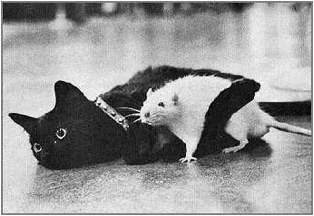
When Rats Find Cats Alluring
Toxoplasma gondii

Another such culprit is a momentous if commonplace human hanger-on that also bedevils rats, cats, and other mammals and has recently been studied in harrowing detail. Spread along the edges of nature, on the boundary where humans and wild animals mix, the world population of Toxoplasma gondii, a particularly mischievous parasite, is ballooning with our own numbers. One way to catch the infection is to eat undercooked kangaroo meat. Kangaroo was recently approved for human consumption in Europe, and it's usually served rare in France, followed, predictably, by Toxoplasma outbreaks. Budi may not be a carrier, since orangs are mainly vegetarians, but some nonhuman primates in zoos have acquired the bug after eating meat from infected sheep. Perhaps most surprisingly, the pathogen is increasing its range through human-made climate change. With northeastern Europe's warmer, wetter winters, more of the pathogen are surviving, and so are its host species. In fact, Toxoplasma gondii may be climate change's oddest bedfellow.What would cause a rat to find a cat alluring? The slinky sashay? Batonlike whiskers? Crescent-moon-shaped pupils? A stare that nails you in place? Only a foolhardy rodent would cozy up to a cat. Yet rats infected with Toxoplasma dramatically change their behavior and find cats arousing. Talk about being in over one's head. There's nothing in it but the briefest frisson for the rat. The cat feeds its belly. But the protozoan zings along the strange trajectory of its life. Since Toxoplasma can only reproduce inside a cat's gut, it needs a brilliant strategy to get from rat to cat, and despite its lack of brain power it devised one: hijacking the rat's sex drive. Toxoplasma - beguiled rats do feel fear when they smell a cat, but they're also turned on by it, in the ultimate fatal attraction. As with human sexuality, or film noir, a side order of fear isn't necessarily a deterrent.
The cat hunts again, dines on infected prey, and the odd hypnotists thrive. Only cats further the parasite's agenda, but other animals can sometimes ingest the eggs without knowing it and become dead-end hosts. That's why pregnant women are warned not to empty kitty litter or handle cat bedding. Exposure to Toxoplasma can derail a fetus, leading to stillbirth or mental illness. Some studies link Taxoplasma and schizophrenia. Infected women have a higher risk of suicide than parasite-free women. According to Oxford researchers, it can doom children to hyperactivity and lower IQs. And, for some reason, over twice as many pregnant women infected with Taxoplasma give birth to boys.
But these new rat-cat findings are only the beginning of an Orwellian saga steeped in irony and intrigue. Worldwide, scientists are posing questions both eye-opening and creepy. If Toxoplasma can enslave the minds of rats --- animals often studied to test drugs for humans --- can it also alter the personality of humans? What if that yen to go rock-climbing or change jobs isn't a personal longing at all, robust and poignant as it may feel, but the mischief of an alien life form ghosting through your brain? is Toxoplasma to blame for a hothead's road rage? How about a presidential hopeful's indiscreet liaisons, or a reckless decision made by a head of state? Could a lone parasite change the course of human history?
So when is a whim not a whim? It feels like we have free will, but is a tiny puppeteer pulling the strings of billions of people? For the longest time philosophers, theologians, and college students debated such questions, then neuroscientists joined the fray, and now a body of parasitologists.
When Jaroslav Flegr, of Charles University in Prague, surveyed people infected with Toxoplasma, he found clear trends and surprising gender differences. The women spent more money on clothes and makeup and were more flirtatious and promiscuous. The men ignored rules, picked fights, dabbled in risk, and were nagged by jealousy. Both sexes got into more than twice the average number of traffic accidents --- as a result of their impulsivity or slowed reaction time.
Rats have proclivities and tastes. Humans have those in spades, as well as sentiments and reveries. But mindset doesn't matter. All warm-blooded mammals respond to thrill, anticipation, and reward --- especially if that includes a wallop of pleasure. Many of the odd behavioral changes scientists attribute to Toxoplasma tap the brain's dopamine system, and that's what Toxoplasma zeroes in on, rewiring networks to favor its own offspring, even if that means death for the host. Cocaine and other euphoriants use the same dopamine system. As the Stanford neuroscientist Robert Sapolsky explains, "the Toxoplasma genome has the mammalian gene for making the stuff. Fantastic as it sounds, a humble microbe is fluent in the dopamine reward system of higher mammals.
"This is a protozoan parasite that knows more about the neurobiology of anxiety and fear than twenty-five thousand neuroscientists standing on each other's shoulders," Sapolsky adds, "and this is not a rare pattern. Look at the rabies virus; rabies knows more about aggression than we neuroscientists do. . . . It knows how to make you want to bite someone, and that saliva of yours contains rabies virus particles, passed on to another person." It's an extraordinary genetic tool for a witless one-celled creature to wield.
Marine mammals and birds are spreading the parasite via water currents and ribbons of air. How many of us may already be unwilling hosts? According to the Centers for Disease Control and Prevention, 10 to 11 percent of healthy adults in the United States tested positive for Toxoplasma, and the true figure (most people haven't been tested) is thought to be 25 percent of adults. Some scientists estimate that in Britain, a decidedly cat-loving country, half the population has been infected, in France and Germany 80 to 90 percent, and in countries that favor undercooked meat even more, with nearly everyone an unwitting mark --- destiny's child, to be sure, but also Toxoplasma's zombie.
According to Nicky Boulter, an infectious disease researcher at Sydney University of Technology, eight million Australians are infected, and "infected men have lower IQs, achieve a lower level of education, and have shorter attention spans. They are also more likely to break rules and take risks, be more independent, more anti-social, suspicious, jealous, and morose, and are deemed less attractive to women.
"On the other hand, infected women tend to be more outgoing, friendly, more promiscuous, and are considered more attractive to men compared with noninfected controls. In short, it can make men behave like alley cats and women behave like sex kittens."

--- From The Human Age
The World Shaped by Us
Diane Ackerman
©2014 Norton